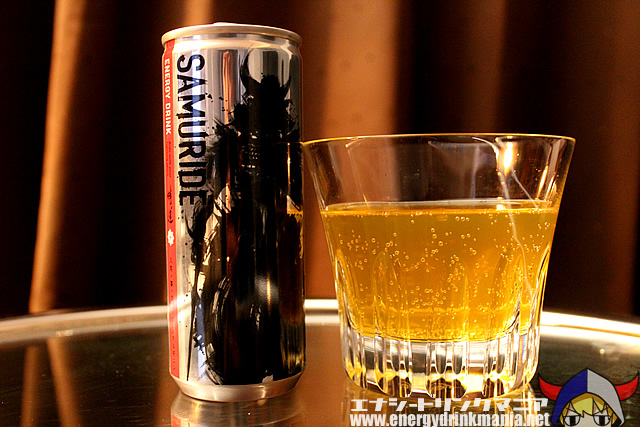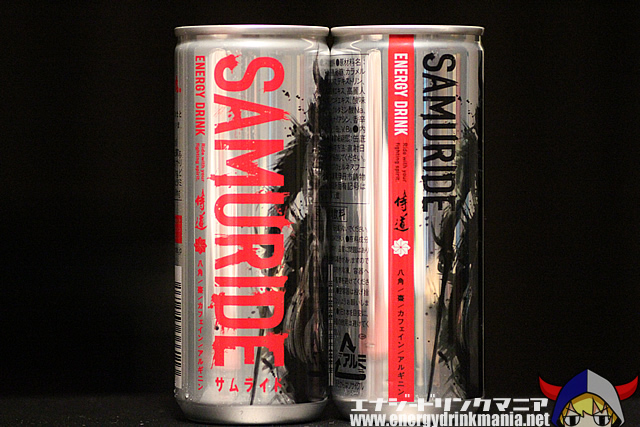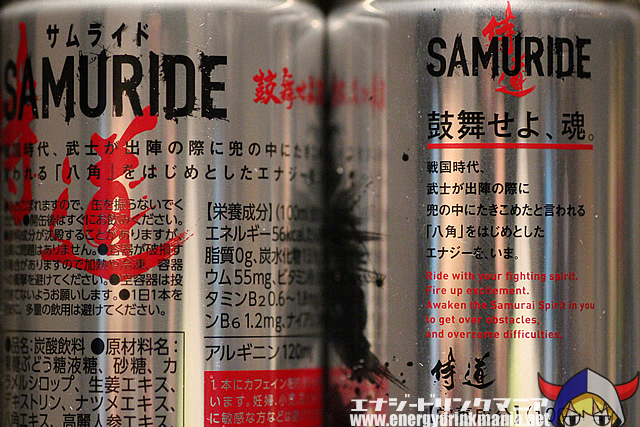SAMURIDE

SAMURIDE (Samuraido) was released by House Wellness on March 17, 2014. When written in kanji, it’s "侍道" (Samurai Road).
The package design features a samurai on horseback, drawn in a sumi-e style by ink artist Hidekichi Shigemoto. It doesn’t feel cheap and surprisingly avoids the typical "cringe-worthy" vibes, making it a uniquely Japanese energy drink inspired by the samurai motif.
SAMURIDE
| Manufacturer | HOUSE WELLNESS FOODS |
|---|---|
| Country of Origin | |
| Price | 190 JPY |
| Flavor | TCM & Herbal Medicine、classic flavor、Spicy |
| Total rating | ★★☆☆☆ |
 Author: Energy Drink-kun
Author: Energy Drink-kun
In 2001, while living in the United States, I encountered energy drinks through the dance scene and was deeply impressed. After returning to Japan, I found that energy drinks were considered novelty beverages, so I established a comprehensive website in 2013 to share the true appeal of energy drinks. As an energy drink enthusiast, I began drinking them seriously again, collecting over 7,000 varieties of energy drinks from various countries. I am also active as a critic and expert, receiving media interviews.
Flavor of SAMURIDE
A slightly cloudy yellow color—this is the classic color of an energy drink.
According to House Wellness Foods’ release information, SAMURIDE contains a spice flavor in its energy ingredients. I thought to myself, "Japanese energy drinks tend to have a spicy kick, and I’m not fond of that," so I wasn’t expecting much.
However, when I actually tried it, it was a classic energy drink flavor with a hint of spice. The ginger-like heat wasn’t overwhelming, and the aftertaste only had a mild tingling sensation. Even someone as sensitive to spice as me (Energy-Drink-Kun) could handle it. For most people, the spiciness may not even be noticeable.
The spice sensation is more noticeable in the aroma than in the taste, so it’s definitely in line with the typical Japanese spiced energy drink flavor.
There’s also a slight medicinal taste and aroma, but rather than aiming for a chemical flavor, it seems the intention was to emphasize the herbal ingredients like traditional Chinese medicine. The chemical flavor is only a slight concern, but it’s not the type of taste that becomes addictive.
Energy Ingredients of SAMURIDE
According to the release page for SAMURIDE, it contains traditional Japanese ingredients such as star anise, jujube, ginger, ginseng, and eleuthero. The development of the product was supported by the Japan Pharmaceutical University.
According to House Wellness Foods, star anise was used by samurai in the past as a way to inspire themselves before going into battle, by burning it in their helmets. Oh, they didn’t drink it, did they? Some of you might have wondered. (laughs)
Jujube is known for its tonic and calming properties. I don’t think there’s been another energy drink anywhere in the world that combines star anise and jujube.
Along with these unique ingredients, SAMURIDE also contains standard amounts of caffeine (80mg) and arginine (300mg), which are typical amounts for energy drinks.
Changes to SAMURIDE’s Design
I noticed that in November 2014, SAMURIDE’s can design changed.

The "SAMURIDE" text became larger and red, with "サムライド" written underneath in katakana for clarity. I think the new red logo makes a stronger impact. Although I also liked the old design with the red lines—it was cool and simple.

The back of the can now features a larger "侍道" (Samurai Road) in kanji, further emphasizing the SAMURIDE world. I personally prefer this new design. The addition of "サムライド" in katakana on the back suggests that the product might not have been widely recognized as "Samuraido" at first. I’ve seen tweets like "I drank the samurai" a few times as well.
Energy Drink-kun's Personal Rating
- Flavor

- Aroma

- Weight

- Freshness

- Munchiness



 Since 2001, Energy Drink Maniac has been drinking energy drinks and providing the most detailed reviews of global energy drinks based on firsthand research.
Since 2001, Energy Drink Maniac has been drinking energy drinks and providing the most detailed reviews of global energy drinks based on firsthand research.